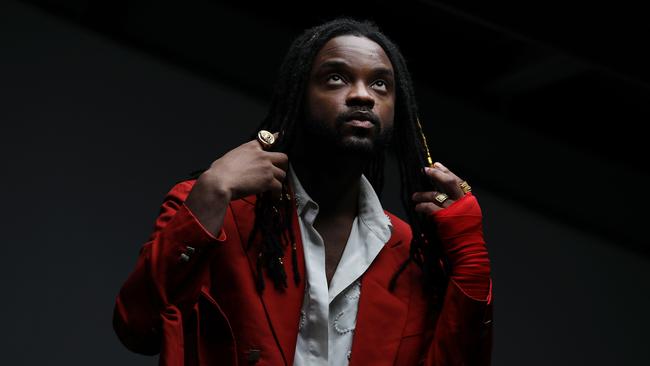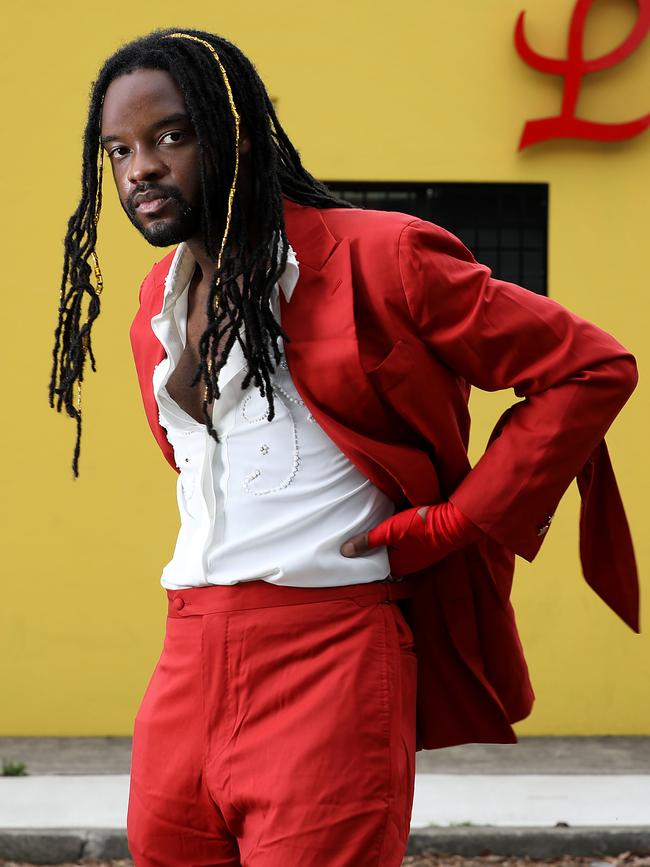Genesis Owusu triumphs at 2021 ARIA Awards with heady, clever concept album
Genesis Owusu’s ARIA Award-winning debut centres on the artist’s experiences with depression and racism as a boy born in Ghana and raised in Australia since he was a toddler.

Concept albums were popularised in the 1960s, when music consumption was limited to what you heard on the radio and what you could afford to buy on vinyl.
We don’t live in that world anymore. Today, music is ubiquitous. Singles dominate the culture, not albums. All but the most popular music in the world tends to be ephemeral, flicking in and out of sight like fireflies in dire need of a recharge.
All of which makes the 2021 ARIA Award winner for album of the year even more remarkable. More than just a collection of great songs, it’s a 15-track release rooted in a clearly defined narrative, with memorable characters, a musically adventurous band and an engaging narrator.
Smiling With No Teeth by Genesis Owusu is an absorbing concept album about weighty and deeply felt subject matter: the artist’s experiences with depression and racism as a boy born in Ghana and raised in Australia since he was a toddler.
Although it also won best hip-hop release, describing Genesis Owusu as a hip-hop artist feels reductive and inaccurate, as the album’s musical roots are spread wide and take in elements of funk, punk, electronica, rock, jazz and folk music.

At 23, the artist born Kofi Owusu-Ansah is already a seasoned songwriter and performer, as well as a thoughtful, creative and ambitious musician. Yet his work is not widely known beyond the bounds of Triple J, the national youth broadcaster, which last week named Smiling With No Teeth its album of the year.
‘Non-commercial’ is putting it mildly: this work debuted at No.27 on the ARIA chart in March, which indicates it didn’t sell (or stream) many copies on its release.
Yet here it is eight months later, winning the award that most serious artists continue to prize above all others, because creating a compelling, cohesive and long-lasting set of songs remains just as challenging today as it did in the era of Pet Sounds, Sgt. Pepper’s Lonely Hearts Club Band, Tommy and Dark Side of the Moon.
Owusu’s breakout success on Wednesday night, where his four-ARIA haul was completed by awards for best independent release and best cover art, might be the moment where his music tips over into the mainstream.
It deserves to. This is the sort of album that rewards sustained listening, filled as it is with a heady brew of potent lyrical imagery couched in the darker, uglier sides of human nature.
If that all sounds a little serious, though, make no mistake: many of these genre-hopping arrangements are designed as catchy tracks that will fill a dance floor or get a festival crowd bouncing to the beat.
In the vein of songwriting greats like The Beach Boys, whose catalogue is littered with sad songs set to uplifting melodies, or 1999 by Prince – a party song about the world ending – Owusu has skilfully applied a glossy veneer atop an intricately painted canvas.
“I’m doing these things very intentionally, but I’m not here to force any kind of interpretation or feeling on anyone,” he told The Australian in an interview last month. “I do want people to be able to enjoy the music on whatever level they want to enjoy it.
“If you just want a catchy beat and catchy hook to dance to, then sure, have it,” he said. “If you want something deeper, about what I’m really feeling, then you can listen a bit harder and get that as well.”
That dichotomy is exemplified on his song The Other Black Dog, a hypnotic track built on a pounding drum pattern and an ascending chord progression that gives the feeling of a chase scene in a film.
“All my friends are hurting, but we dance it off, laugh it off / Scars inside our shoes but we just tap it off, clap it off,” Owusu raps in the opening verse. It’s about his generation living with depression, but feeling unable to open up about the truth.
In the chorus, he inhabits depression – one of two “black dog” characters to appear on the album – while singing, “I want to be your golden thorn / You’ll love me ‘til you die […] I want to be your flesh and bone / You’ll take me to the grave”.
A few tracks later, the narrator has a therapy-inspired realisation: he is not defined by his mental illness, and he can, in fact, live without it. “Wait, could this be true? / I don’t need you,” he sings in the chorus of a song that scans as a gleeful anthem of freedom from depressive tendencies.
Growing up in Canberra, Owusu latched onto the generation-defining US hip-hop artist Kendrick Lamar, and particularly his much-lauded third album To Pimp a Butterfly, which was released in 2015.
“I knew I wanted to make a concept album, and that is my pinnacle of what a concept album is,” he said. “That album came out when I was in year 12, and I studied it harder than anything I studied in school at the time.
“I knew it front to back, and I knew the essence of it, and the energy that it brought,” he said. “I was really trying to capture that feeling and that cohesiveness, and then transfer it into my own work.”
Smiling With No Teeth had its roots in a couple of intensive songwriting sessions in 2019, wherein Owusu and his band – Kirin J. Callinan, Julian Sudek, Andrew Klippel and Michael Di Francesco – jammed ideas for 10 hours at a time in a bedroom-sized Bondi studio. Owusu would review recordings of those sessions, then write lyrics to the musical beds that caught his ear.
The second “black dog” of the album, which emerges as a character in the second act, is that very racial epithet, which Owusu has been called himself.
“The album title in itself basically translates to a fake smile, or putting on a performance to people who don’t really care anyway,” he said. “It was crafted like that musically, because in real life, I had to do that.
“When I wanted to talk to people in general about things like racism or depression, they had to be sugar-coated, or glazed in honey for people to be comfortable enough to talk about it at all,” he said. “I definitely wanted to express that in the music.”
One of the most thrilling moments in Australian music released this year occurs in the album’s second act, during the song Whip Cracker.
Its first two minutes contain only Owusu’s fierce vocals, an insistent tom drumbeat and spectral keyboard notes; in its final two minutes, the arrangement explodes into an extended funk-rock jam that would surely make Prince smile and nod. His performance of this song on ABC TV’s The Set earlier this year, backed by his Black Dog Band, bristles with electricity.
Released by independent label Ourness, Owusu’s triumph at the ARIA Awards is shared among a tight-knit team of true believers who delayed the album’s release almost a year due to the pandemic.
Their patience paid off: his name and his work will now be much more widely known. With his live performance calendar filling up – including a run of US shows in January, and supporting last year’s five-time ARIA Award winner Tame Impala on its Australian tour in October – it will be thrilling to watch where Owusu takes his art from here.
Held before a small live audience of industry members due to a decision taken by organisers months ago in the grip of Covid restrictions, the 2021 ARIA Awards were not broadcast on television, and were instead streamed from Sydney’s Taronga Zoo on YouTube and 9Now.
As a result, emerging stars like Genesis Owusu and Budjerah – the 19-year-old singer-songwriter who won the inaugural Michael Gudinski breakthrough artist award – were denied the chance to expose their work to curious channel-surfers. More’s the pity.
In the first year that the Australian Recording Industry Association made the decision to vacate its traditionally gender-based awards in favour of a single trophy for best artist, it was won by a man who only recently reached adulthood: The Kid Laroi, the 18-year-old hip-hop artist who grew up in Sydney and has more recently set the pop music world alight with Stay, his chart-topping collaboration with Justin Bieber.
The Kid Laroi also won best pop release for Stay, and it’s hard to overstate how successful that song has been since its release in July. One factoid worth mentioning: earlier this month, it became the fastest song to reach one billion streams on Spotify, beating a record that Ed Sheeran’s song Shape of You had previously held for four years.
In the public voted awards, Vance Joy won best video for Missing Piece and Lime Cordiale won best Australian live act, beating out the likes of Midnight Oil and Genesis Owusu.
Fittingly, Taylor Swift was named most popular international artist in a week where old things have been remade new: Swift’s re-recorded 2012 album Red presently sits atop the ARIA chart, while her song All Too Well is also No.1 on the singles chart.
The big surprise in the public voted categories was Perth band Spacey Jane winning song of the year for its gorgeous track Booster Seat, which also ranked No.2 in the Triple J Hottest 100 earlier this year. Chalk this one up as a win for the little guys and their avid fans, as the quartet triumphed over major artists including Keith Urban, The Kid Laroi and Amy Shark.
The other sentiment attached to this year’s celebration of Australian music is one of relief. After a year in which plenty of much-needed discussion and action has centred on changing the industry’s workplace culture and removing toxic personalities from leadership positions, it was a joy to put the spotlight back where it belongs: on the artists.
2021 ARIA winners:
Album of the year Genesis Owusu, Smiling With No Teeth
Best artist The Kid Laroi
Group Rufus Du Sol
Michael Gudinski breakthrough artist Budjerah
Rock album Middle Kids, Today We’re the Greatest
Adult contemporary album Crowded House, Dreamers Are Waiting
Country album Troy Cassar-Daley, The World Today
Hard rock/heavy metal album Tropical F..k Storm, Deep States
Blues & roots album Archie Roach, The Songs of Charcoal Lane
Children’s album Bluey, Bluey The Album (composed by Joff Bush)
Pop release The Kid Laroi, Stay (with Justin Bieber)
Hip-hop release Genesis Owusu, Smiling With No Teeth
Soul/R&B release Tkay Maidza, Last Year Was Weird, Vol. 3
Independent release Genesis Owusu, Smiling With No Teeth
Dance release Rufus Du Sol, Alive
Public-voted awards:
Video Vance Joy, Missing Piece
Song of the year Booster Seat, Spacey Jane
Australian live act Lime Cordiale
International artist Taylor Swift
Music teacher Zoe Barry, Sacred Heart School, Melbourne
Artisan awards:
Cover art Kofi Ansah and Bailey Howard for Genesis Owusu
Engineer of the year Konstantin Kersting
Producer of the year Konstantin Kersting and The Rubens
Fine arts awards:
Classical album Genevieve Lacey and Marshall McGuire, Bower
Jazz album Mildlife, Automatic
Original soundtrack or musical theatre cast album Angus and Julia Stone, Life is Strange
World music album Joseph Tawadros, Hope in an Empty City





To join the conversation, please log in. Don't have an account? Register
Join the conversation, you are commenting as Logout